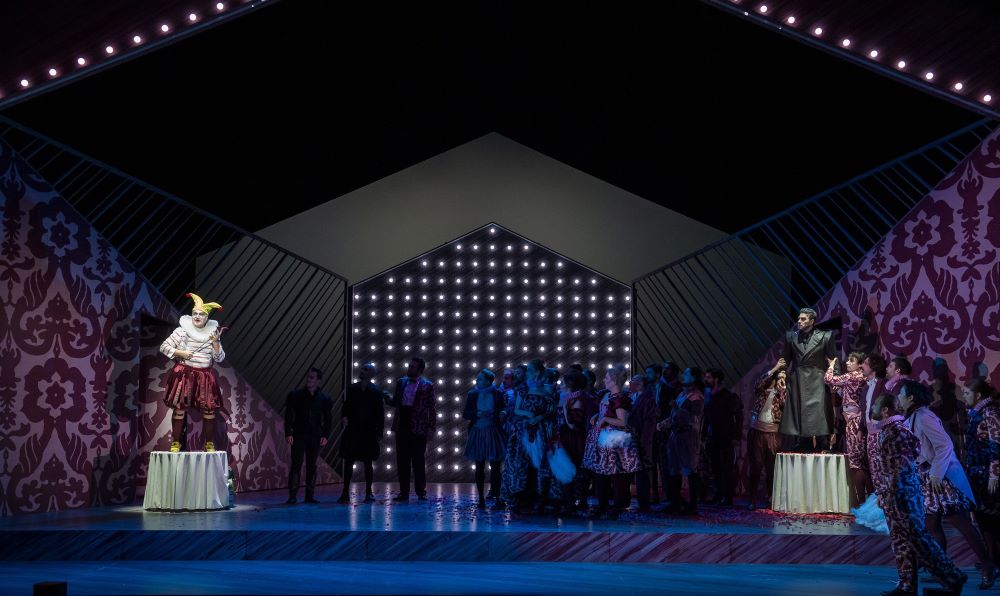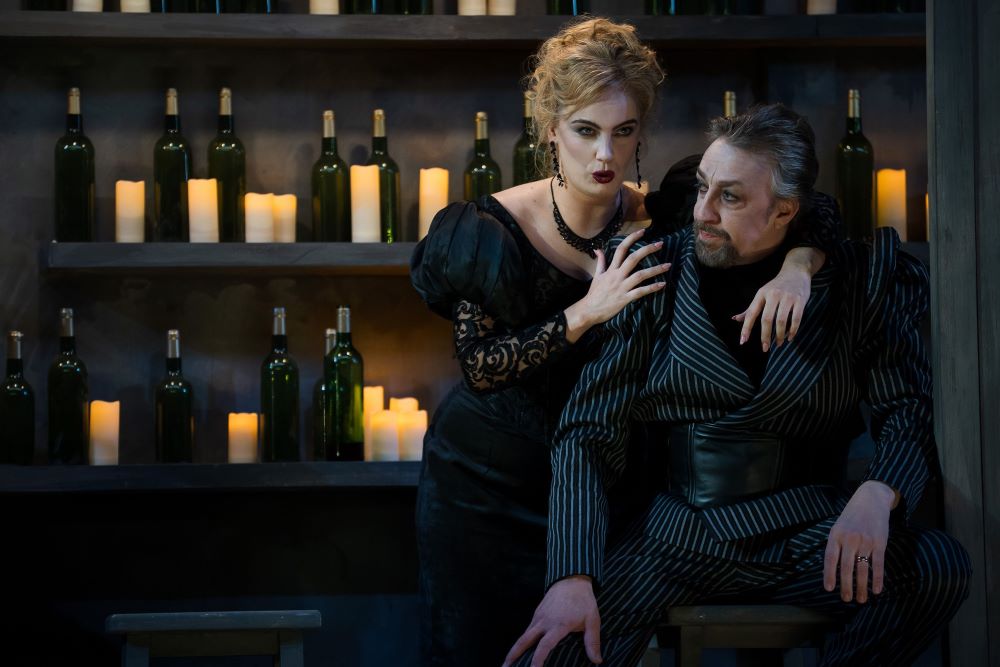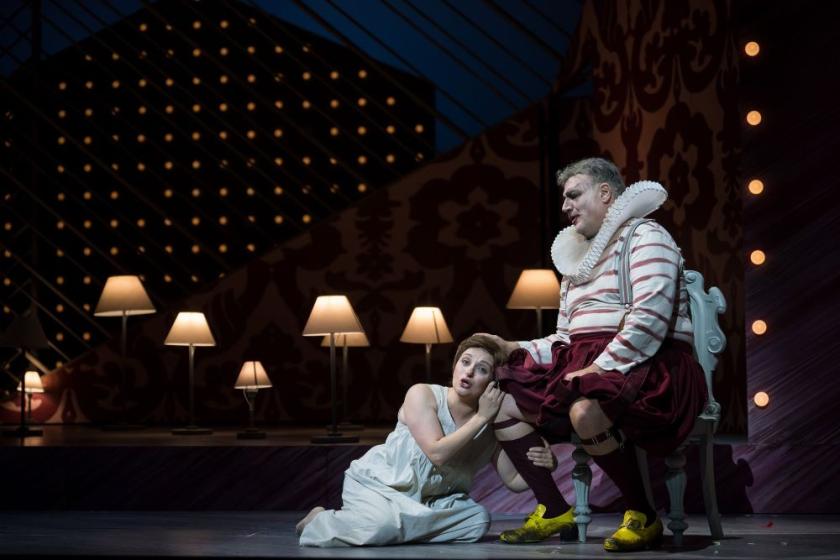How many Rigolettos have regular operagoers among you sat through where there wasn’t some major defect, in either the production or the three major roles? Here, there is none. INO’s jester and Duke are well cast, its Gilda supernaturally perfect in music and acting, while Julien Chavaz’s production, despite a few passing irritations, adds up to a coherent and disciplined whole. INO Artistic Director Fergus Sheil keeps Verdi's vivid music theatre on the move.
Do Irish audiences know how lucky they are to see world-class opera again and again? Last night's full house, in marked contrast to the limited number of spectators so intensely hooked on a dramatic, site-specific retelling of Joyce's The Dead on Tuesday, kept up a storm of uncovered coughs throughout, no doubt amplified by the very live acoustics of the Libeskind-designed Bord Gáis Energy Theatre, so good for opera. We could certainly hear everything on stage and from the pit.  Jamie Vartan's design, often filled by Jean-Jacques Delmotte's colourful costumes, features courtly fleur-de-lys walls sloping back to show lights at the back, within a gaudy frame: perfect for the stylized moves through which Nicole Morel puts a hard-working chorus – no slack or gratuitous debauchery at this duke's court – if potentially worrying for dark street and riverbank scenes (pictured above: Michael Chioldi's Rigoletto cursed by Phillip Rhodes' Monterone with chorus).
Jamie Vartan's design, often filled by Jean-Jacques Delmotte's colourful costumes, features courtly fleur-de-lys walls sloping back to show lights at the back, within a gaudy frame: perfect for the stylized moves through which Nicole Morel puts a hard-working chorus – no slack or gratuitous debauchery at this duke's court – if potentially worrying for dark street and riverbank scenes (pictured above: Michael Chioldi's Rigoletto cursed by Phillip Rhodes' Monterone with chorus).
Those are partially solved by the symmetrical appearances of two rooms towards the front of the stage – Rigoletto's gilded cage for his daughter Gilda on the left, later Sparafucile's inn on the right, candles atmospherically replacing the multiple palace lamps of Act Two. None of this is realistic, so maybe one shouldn't make the usual quibbles about too much light to show Rigoletto where he is, or a supposedly safe house the front door of which opens so readily to strangers. I could have done without the bits of jester face carried around during the Prelude, though the head in lights at the end is powerful: the jester's show going beyond his plans, and a disconcerting alternative to the usual bare banks of the river Mincio after a storm.
 If the visuals are surreal, the interrelationships of the characters are intensely human. Chavaz doesn't suppress the so-often-referenced hunchback "deformity" of his protagonist, a big, powerful figure in Met-favoured American Michael Chioldi's resonant characterisation. Like so many Rigoletto's he can't quite scale back the Verdi-baritone force for sheer tenderness in concern about his beloved, motherless child, but the rest is so impressive; Chioldi rises perfectly to the demands of Rigoletto's fury and hubris. His master is just what we need and so rarely get: handsome of form, a true ringing tenor di grazia who can also act in the ideal shape of Azeri tenor Bekhzod Davronov (pictured left by Kristina Kalinin; Davronov was ill when final rehearsal photos were taken).
If the visuals are surreal, the interrelationships of the characters are intensely human. Chavaz doesn't suppress the so-often-referenced hunchback "deformity" of his protagonist, a big, powerful figure in Met-favoured American Michael Chioldi's resonant characterisation. Like so many Rigoletto's he can't quite scale back the Verdi-baritone force for sheer tenderness in concern about his beloved, motherless child, but the rest is so impressive; Chioldi rises perfectly to the demands of Rigoletto's fury and hubris. His master is just what we need and so rarely get: handsome of form, a true ringing tenor di grazia who can also act in the ideal shape of Azeri tenor Bekhzod Davronov (pictured left by Kristina Kalinin; Davronov was ill when final rehearsal photos were taken).
The hardest task, both dramatically and vocally, falls to the Gilda, at first a coloratura ingenue, later a passionate if horrifyingly misguided victim in love with her rapist. Soraya Mafi, fresh from singing the role for Welsh National Opera, returns to her part-Irish roots in what for me is the operatic performance of the year: embracing humorous girlishness in trying to get her dad and new boyfriend out of the house, almost floating away from the balcony in a breathtaking "Caro nome", later lacerating in her anguish, pulling out reserves of spinto power which I hope will get her cast a little bit beyond the lyric sphere. The Act Three Quartet is surely the lushest ever, given the total star quality of Niamh O'Sullivan as a commanding Maddalena to add to the lustrous line-up. Only Julian Close as her brother, assassin Sparafucile (pictured below with O'Sullivan), overdoes it vocally: there could be subtler flesh-creep in his first encounter with Rigoletto. The benchmark here will always be Callum Thorpe, who stole the show at Opera North.  Once or twice the chorus get a touch out of synch with Sheil, but that will settle after the first night, and their moves are demandingly nifty. You're left with a sense of shock and awe at how much master of stagecraft Verdi was long before the later glories of his long operatic career. It's a horrid story, but Victor Hugo's play offered Shakespearean opportunities; INO's director, cast and orchestra as well as the composer himself rise to them all.
Once or twice the chorus get a touch out of synch with Sheil, but that will settle after the first night, and their moves are demandingly nifty. You're left with a sense of shock and awe at how much master of stagecraft Verdi was long before the later glories of his long operatic career. It's a horrid story, but Victor Hugo's play offered Shakespearean opportunities; INO's director, cast and orchestra as well as the composer himself rise to them all.
Earlier that afternoon the glorious mezzo Paula Murrihy, whose request for a concert performance of Berlioz's Béatrice et Bénédict INO honoured in October, returned to the National Concert Hall, this time to the Kevin Barry Recital Room which is almost too small to contain her. But the thousand nuances made all the difference, and the roundings-off in Berlioz's Les nuits d'été by Dublin Song Series curator Dearbhla Collins were exquisite compensation for the fact that though these songs were originally composed with piano accompaniment, it wasn't Berlioz's natural element. Having begun with a meaningful Schumann "Widmung" followed by two songs from Clara, Murrihy went straight to the poised heart of the matter.  This time, the refrains of "Sur les lagunes" struck even deeper and more passionately than in her Wigmore Hall recital, though there is nothing lovelier in the musical world than the repetitions in "Absence". Sadly the NCH hadn't planned well enough to let some of us get from there to the Bord Gais Theatre in time for Rigoletto's 5pm start, so we had to foresake post-interval Ina Boyle and Britten's Cabaret Songs – though I know from the Wigmore event that Murrihy does those better than anyone.
This time, the refrains of "Sur les lagunes" struck even deeper and more passionately than in her Wigmore Hall recital, though there is nothing lovelier in the musical world than the repetitions in "Absence". Sadly the NCH hadn't planned well enough to let some of us get from there to the Bord Gais Theatre in time for Rigoletto's 5pm start, so we had to foresake post-interval Ina Boyle and Britten's Cabaret Songs – though I know from the Wigmore event that Murrihy does those better than anyone.















Add comment